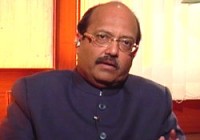To sting or not to sting?

In my limited experience at the helm of regional news channels, I have come across only one occasion when the channel had to spike the news footage without telecasting it. That was when one of the worst communal riots was raging in the Old city of
But what happened on Tuesday just two hours before the crucial vote on Dr Man Mohan Singh¿s motion of confidence, when three MPs disgorged bundles of cash on the table of the House, sounds a bit bizarre both on the part of the political class and the channel concerned. CNN-IBN which had done a sting declined to telecast the sting operation they carried on the attempts to bribe the BJP MPs, instead deciding to handing the tape over to the Speaker of the Lok Sabha.
Let me confine myself only to the channel¿s decision not to telecast the footage, but hand it over to the Speaker of the Lok Sabha. This raises a few questions:
- Is it the job of a TV channel to provide proof to any Constitutional authority, in this case the Speaker, before it could telecast the news to its viewers?
- Does this not give handle to critics to allege that the channel was silenced? In fact, in a panel discussion in another channel, this was hinted.
- It is possible that the channel might have felt that it was taken for a ride by unscrupulous politicians and thus the whole episode was quite fishy. So, it was not fair to telecast the tape since the channel itself was not convinced about the authenticity of the whole operation. In such a case there was no need for the channel to hand over the tape to the Speaker.
- The editor-in-chief of the channel gave quite a righteous bite that the channel did not want to be part of the bitter political battle. For the last one week, politicians and the media have been making allegations that lot of money is changing hands. Politicians especially from the UPA, named parties from where there will be abstentions or cross voting to bail out the UPA. In many discussion forums on the channels, the media was taunted for not doing anything to investigate these charges and the anchors were only asking "Where are such huge amounts coming from?" When CNN-IBN did a sting to expose such dirty operations, why did they feel shy of telecasting the news, especially in the context of the channels outsourcing such sting operations in the past for an astronomical fee?
- A statement from the channel says "While trying to investigate deeper into this trail, we realized that the issue needed further probing and we could not at this stage telecast it without further verification". If the job was only half done, why did the channel decide to hand over the incomplete tape to the Speaker? What purpose does it serve?
- The statement further says: "We are also aware that as the matter involves honourable members of Parliament and involves a question of parliamentary privileges, the media needs to be extra cautious before airing or telecasting any such news". This is quite funny. The "cash for query" sting and scam involving MPs Constituency Development Fund, related to "honorable members of Parliament" and the channels that telecast these sting operations received applause from all quarters. No channel was punished for breach of privilege. Why did CNN IBN develop cold feet on this sting, especially when it claims "Whatever it takes"?
- Is the reluctance to telecast due to the fact that the concerned MPs preempted the channel by disclosing the "Cash for Votes" operation on the floor of the House violating an understanding? Telecast of the tape, after the operation was exposed on the floor of the house, would give the impression that the channel was in cahoots with the BJP and was trying to support the BJP in the murky political scenario. If the bribe episode allegedly by the SP was true, the channel should not have bothered about the after-effects of telecast and should have stood by the truth. Only then, their tagline "Whatever it takes" would be credible. Otherwise, it is only a verbal jugglery.
- "Publish and be damned" is the idiom mediamen are taught right from the journalism schools. How far is this relevant today? That is the crucial question.
Probably, before publishing/telecasting, we have to think twice or more of the consequences or how the telecast material would hurt one set of politicians or the other.